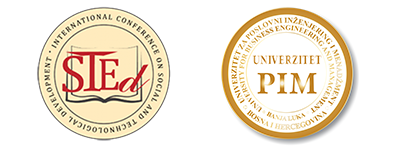ASSESSMENT OF ANTIMICROBIAL AND ANTIOXIDANT ACTIVITY OF THE ACETONIC EXTRACT OF ARMILLARIA GALLICA BASIDIOCARPS AND ANALYSIS OF THE PRESENCE OF METALS
Armillaria gallica Marxm. & Romagn., commonly known as bulbous honey fungus, is a species of mushroom that is conditionally edible, typically appearing during autumn. The objective of this study was to assess the antimicrobial and antioxidant activity of the acetonic extract of A. gallica and to analyze the presence of metals in its dry b...
By Nevena Petrović, Zoran Simić, Marijana Kosanić
APPLICATION OF ARTIFICIAL NEURAL NETWORKS ACROSS VARIOUS DOMAINS: A RESEARCH OVERVIEW
The research provides an examination of the Artificial Neural Networks (ANNs) applicationacross diverse domains of creativity. In addition to exploring the theoretical background ofmachine learning and artificial intelligence, numerous practical applications of ANNs arediscussed in fields such as education, agriculture, traffic, environmental prote...
By Marija Blagojević
INNOVATIONS AND TEACHING SYSTEMS IN THE TEACHING OF NATURE AND SOCIETY
The specificity of innovations and innovative ways of working in teaching dates back to the previous years of the educational system, but it always requires upgrading and improvement, especially use and application in practice. There has been a lot of talk about potential teaching systems, but there has always been a problem regarding applica...
By Dragana Aleksić
MICRO:BIT AS A NEW TECHNOLOGY IN EDUCATION IN SCHOOLS IN SERBIA
The gap between abstract and often inconceivable frontal studies and the new wave of practical teaching, which forces the individualization and independence of students in education, is overcome by the introduction of new technologies, one of which is Micro:bit. By teaching students digital-technical literacy in a fun way, the interest and wi...
By Milan Veskovic, Vasilija Simovic, Srđan Nogo, Olga Dukic, Ana Vulovic
POSSIBILITIES OF USING SOFTWARE TOOL IN THE EDUCATIONAL PROCESS IN THE FIELD OF SURFACE FINISHING AND HEAT TREATMENT
Software support may have an important role in the educational process in the field of surface treatment and thermal processing. With the rise of digitalization, software tools have become invaluable means for teaching and learning complex concepts and procedures. These tools enable students to better understand aspects of surface treatment a...
By Ján Duplák, Darina Dupláková, Maryna Yeromina, Samuel Mikuláško, Róbert Pyteľ
STUDENTS EXPECTATIONS TOWARD UNIVERSITY CAREER FAIRS: A CASE STUDY OF ENGINEERING FACULTY STUDENTS IN HUNEDOARA
The purpose of this study is to identify the reasons why individuals attend university career fairs and the expectations they hold toward these events. Additionally, the article seeks to understand the students views on the usefulness of these events and assesses the strongest points of the fair. The event chosen for the study is the Career F...
By Mihaela Popa, Ljubica Janjetovic, Adrian Eugen Cioablă
ORGANIZATIONAL MODEL 7S IN THE CONTEXT OF ORTHODOX AND ETHICAL BUSINESS LEADERSHIP
The growing trend of interest in Christian ethics and spirituality influenced organizational models and behavior. Spirituality gives meaning to every activity, including organizational leadership, and it provides a framework for using organizational models. The aim of the work is to connect the selected elements of the famous McKinsey model 7...
By Milan Resimić
NEEDS FOR EDUCATIONAL REFORM IN PHARMACY
Introduction: The needs within the health system and society as a whole require an urgent change in the education of masters of pharmacy, both in terms of health specializations and academic ones. New pathologies, new drugs and a completely changed way of life of citizens set an imperative in accepting a new way of education for a master of p...
By Zahida Binakaj, Svetlana Stojkov, Tanja Stevanović- Pavlović, Hatidža Karić, Amela Škapur, Enisa Halilović, Emina Suljagić
MANAGEMENT OF AMORTIZATION CALCULATION ON THE BASIS OF FINANCIAL STATEMENTS IN PROFIT PROJECTION
The modern economic understanding equates company in terms of ownership, the owner of the alliance, and in this regard arises variable combination of the priority objectives in which priority is given to the objectives defined by the majority shareholders. The company is a complex organization that operates in terms of external and internal u...
By Ognjen Bakmaz, Darko Martinov, Dragan Vukasović
THE DEVELOPMENT, SITUATION AND MANAGEMENT OF TOURIST THEMATIC ROUTES IN HUNGARY AND GERMANY
The tourist themed routes go back almost 100 years. First of all, they are of great importance within the field of tourism, and even today they are effective tools for tourism development and rural development. In the 1990s, the first thematic tourist routes were created in Central and Eastern European countries. Their creation, operation and...
By Mónika Pentz, Tibor Gonda






